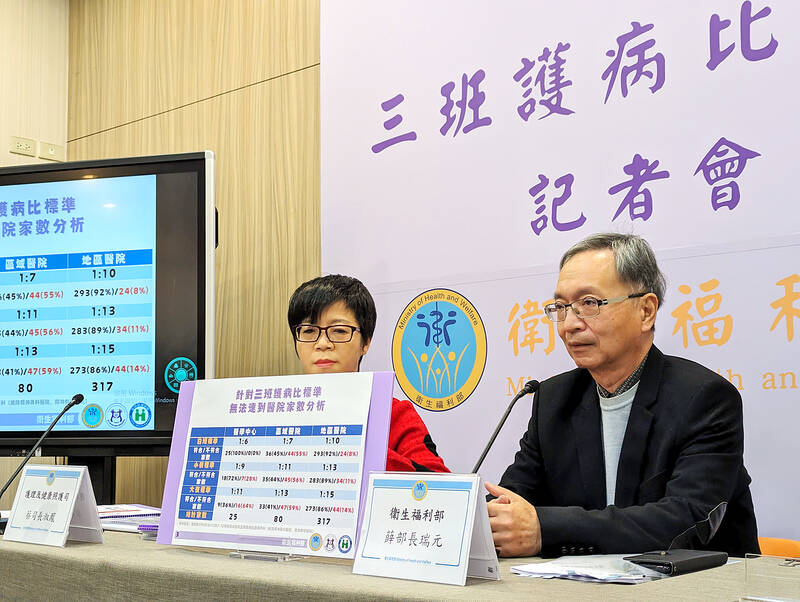New standards on personnel assignment ratios in compliance with new hospital rotation schedules and cash rewards to incentivize staff to be more willing to work night and graveyard shifts are to take effect on March 1, the Ministry of Health and Welfare said yesterday.
It is hoped the standards could balance the ratio of medical personnel to patients in a manner that reduces stress for personnel, while addressing the issue of a short-staffed medical industry, Minister of Health and Welfare Hsueh Jui-yuan (薛瑞元) said at a news conference, adding that the version introduced referenced proposals submitted by the Taiwan Union of Nurses Association.
The ministry is setting aside a special budget of NT$4 billion (US$127.8 million) for monetary incentives for those working night shifts, he said.

Photo: Wu Liang-yi, Taipei Times
Night shift personnel would receive NT$400 to NT$600 per shift, while workers on graveyard shifts would receive NT$600 to NT$1,000 per shift, the ministry said, adding that the cash rewards would be paid out monthly by the National Health Insurance Administration.
If a nurse works 21 days a month, those willing to work night and graveyard shifts would receive an additional NT$6,400 to NT$21,000 per month, the ministry said.
The new shift standards are meant to encourage workers to work night and graveyard shifts, Hsueh said, adding that the ministry is not planning to draft a law on the issue.
In response, the Taiwan Union of Nurses Association yesterday said it was glad the government had taken note of the issue and was introducing measures to resolve it.
However, it is regrettable that the government has ignored the top four demands of the association and the medical industry — that all medical personnel across all shifts should receive cash awards, to prioritize personnel at medical facilities for cash awards and for hospitals to receive the cash awards and pay them to medical personnel, the association said.
The standards as proposed would only leave workers on day shifts feeling that they have been left out, it said, adding that the amount of cash should not be based on the level of a medical facility.
It said it was concerned the policy would create more inequality in shift rotations and encourage medical personnel to work for higher-level medical facilities.
The ministry separates medical facilities into four categories — medical centers, regional hospitals, local hospitals and clinics.

The Taiwanese passport ranked 33rd in a global listing of passports by convenience this month, rising three places from last month’s ranking, but matching its position in January last year. The Henley Passport Index, an international ranking of passports by the number of designations its holder can travel to without a visa, showed that the Taiwan passport enables holders to travel to 139 countries and territories without a visa. Singapore’s passport was ranked the most powerful with visa-free access to 192 destinations out of 227, according to the index published on Tuesday by UK-based migration investment consultancy firm Henley and Partners. Japan’s and

NATIONAL SECURITY THREAT: An official said that Guan Guan’s comments had gone beyond the threshold of free speech, as she advocated for the destruction of the ROC China-born media influencer Guan Guan’s (關關) residency permit has been revoked for repeatedly posting pro-China content that threatens national security, the National Immigration Agency said yesterday. Guan Guan has said many controversial things in her videos posted to Douyin (抖音), including “the red flag will soon be painted all over Taiwan” and “Taiwan is an inseparable part of China,” while expressing hope for expedited “reunification.” The agency received multiple reports alleging that Guan Guan had advocated for armed reunification last year. After investigating, the agency last month issued a notice requiring her to appear and account for her actions. Guan Guan appeared as required,

Japan and the Philippines yesterday signed a defense pact that would allow the tax-free provision of ammunition, fuel, food and other necessities when their forces stage joint training to boost deterrence against China’s growing aggression in the region and to bolster their preparation for natural disasters. Japan has faced increasing political, trade and security tensions with China, which was angered by Japanese Prime Minister Sanae Takaichi’s remark that a Chinese attack on Taiwan would be a survival-threatening situation for Japan, triggering a military response. Japan and the Philippines have also had separate territorial conflicts with Beijing in the East and South China

A strong cold air mass is expected to arrive tonight, bringing a change in weather and a drop in temperature, the Central Weather Administration (CWA) said. The coldest time would be early on Thursday morning, with temperatures in some areas dipping as low as 8°C, it said. Daytime highs yesterday were 22°C to 24°C in northern and eastern Taiwan, and about 25°C to 28°C in the central and southern regions, it said. However, nighttime lows would dip to about 15°C to 16°C in central and northern Taiwan as well as the northeast, and 17°C to 19°C elsewhere, it said. Tropical Storm Nokaen, currently